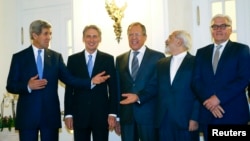After failing to reach their own deadline for a comprehensive nuclear agreement, the world’s major powers and Iran settled for an extended truce that avoids the hard political choices that neither Washington nor Tehran could make.
The decision to prolong last year’s interim agreement for another seven months – the best negotiators could achieve after yet another round of high-level diplomacy in Vienna – will keep Iran from amassing the fissile material for a nuclear weapon without a significant easing of sanctions or breakthrough in U.S.-Iran ties.
Iranian President Hassan Rouhani and Supreme Leader Ayatollah Ali Khamenei declared this outcome a victory for Iranian pride, but millions of their subjects will see things differently. Their hopes for a stronger Iranian economy and an end to Iran’s pariah status will be dashed again and their cynicism about their political system and the globe’s power dynamics will be reinforced.
Rouhani, who has staked his presidency on a nuclear deal, is likely to face new challenges to his authority if the extension does not lead to a successful outcome. The Iranian president may have more difficulty introducing other reforms without the boost in popularity that a comprehensive nuclear agreement would have brought.
Iran agreed to maintain curbs on its nuclear program in return for another $5 billion in oil revenues currently frozen in foreign banks. At the same time, it is likely to continue to try to erode the sanctions regime. The U.S. and its European allies may hold the line but Russia – itself penalized over its aggression in the Ukraine – and China could be less disciplined.
Iran will also look to its neighbors to circumvent sanctions, boosting the underground elements of its and their economies with more smuggling. Iran’s struggling private sector will continue to take a back seat to enterprises controlled by the Revolutionary Guards.
U.S. and Iranian diplomats will continue to meet periodically to discuss the nuclear issue. But without a deal, it will be hard to move relations to the next level to confront regional challenges including the menace from the group that calls itself the Islamic State and the carnage in Syria.
It is even less likely that the U.S. will ask Iran to station American diplomats in Tehran to staff an interests section or establish a direct banking channel between the two countries – steps that would have enhanced people-to-people ties and humanitarian trade.
While Rouhani insisted in an interview on Iranian television on Monday that an agreement would still come, the longer the talks go on, the more opportunity there will be for opponents on both sides to sabotage negotiations – as they already seem to have done.
If Khamenei and fellow hardliners hemmed in the Iranian negotiators, the U.S. Congress, Israel and Saudi Arabia constrained the U.S. negotiating team and diplomats from the other four permanent members of the U.N. Security Council plus Germany.
The Saudis threatened to develop the nuclear fuel cycle if Iran was allowed to continue to enrich uranium under a comprehensive deal.
Israeli Prime Minister Benjamin Netanyahu inveighed constantly against a “bad deal” that would lock in Iran’s nuclear gains and leave the country as a latent nuclear weapons state. On Monday, Netanyahu expressed satisfaction at the failure to achieve a comprehensive accord.
At the same time, Netanyahu and his Likud Party allies in the United States are beating the drum for new sanctions, which could end Iranian compliance with the interim nuclear deal’s restrictions and lead Iran to resume enriching uranium to higher levels.
In announcing the extension of the interim agreement on Monday, Secretary of State John Kerry urged the U.S. Congress to “come to see the wisdom of leaving us the equilibrium for a few months to be able to proceed without sending messages that might be misinterpreted and cause miscalculation.”
But the incoming Republican-led body may have other ideas. On Monday, the American Israel Public Affairs Committee, echoing Netanyahu, urged Congress to "take up new bipartisan sanctions legislation to let Tehran know that it will face much more severe pressure if it does not clearly abandon its nuclear weapons program."
Kerry did not divulge the details of the impasse in negotiations but the stumbling blocks are believed to have included the size of Iran’s uranium enrichment program, the duration of limitations on its nuclear activities and the schedule for lifting economic sanctions. Kerry said that technical experts would meet next month to try to narrow the differences but the long extension of talks removes the sense of urgency successful negotiations generally require.
Coming on the same day that Defense Secretary Chuck Hagel resigned, apparently under fire, the failure to achieve a comprehensive nuclear deal with Iran is another major disappointment for the Obama legacy.
Even as he tries to seize the initiative domestically over issues such as immigration, the U.S. president seems unable to shape events abroad.
The Iranian leadership also bears responsibility for failure, which continues a 35-year pattern of missed opportunities. As always, the biggest losers are the long-suffering Iranian people.











